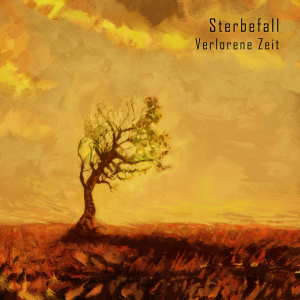
[another review for an ‘older’ release, but then again: what’s the problem???]
I used to follow the Russian formation Sterbefall during their earlier years. Weg Nach Nichtigkeit, Plattensee and even Die Lawine (an acoustic reinterpretation of the past) could surely caress my eardrums. Yet as from 2016, things turned into an ear-deafening silence.
…until (quite) recently (‘quite’, for the release-date of the album I am about to review is almost three years ago). One of my mostly beloved Metal-in-crime partners, Mister Aleksey Korolyov, did sign this band to one of his labels - actually his main label Satanath Records - for the release of Sterbefall’s latest full album (there is an EP being released in early 2023 as well), Verlorene Zeit. Once again, it’s a collaborative release; this time in conspiracy with Italy’s Fog Foundation. There are 500 physical copies (2 editions), besides the digital version, coming with quite original cover artwork; I mean, it's that somber, even asphyxiation-looking color-palette especially that strikes and surprises.
Anyway, Artem (drums), Dmitry (vocals and guitars, as well as mixing duties), Null (bass) and Mikhail (guitars) created more than forty minutes of dystopian atmospheres under the working title of Verlorene Zeit (‘lost time’), their third full-length studio-album in a decade of existence. And it goes even further than ever before; which you will experience immediately when starting listening to opener Kvlt.
What these four guys bring is an extremely dense and heavy form of blackened Doom, melodious, obscure, pounding and negative. The basic structure is like this: a monumental wall of strings, creating avalanche-like rhythms (the bass-lines, for instance, are oh so breath-taking; cf. a piece like Einsamkeit), plus mesmerizing and gloomy dual leads, plus unforgiving drum-patterns, plus raw, little tortured grunts. …that in a nutshell. But of course there is so much more.
A first thing is the use of acoustics. This is not a new element within Sterbefall’s history, for the implementation of acoustic guitars has been done before. And I not referring to Die Lawine solely; also the other recordings came up with acoustic injections. On this album, it’s used carefully and meticulously. It goes for some intros or intermezzos, each time precisely timed and executed, never exaggerated or unnecessary. It surely fortifies the pessimistic and / or melancholic theme of the album (and the unhappy raison d’être of the band, of course). And in a song like Negativ - but I may be mistaken - I seem to hear a violin?...
As said, the (electric) guitars are of a characterizing evidence too. Every single composition sounds harmonious, because of the melodic guitar-performance. Dual and tremolo leads, hypnotic melodies, transcendental soloing; it’s like the ‘core’ of all chapters involved with this recording.
But this cannot exist without the inseparable and unconditional support of the whole rhythm section. The background-strings (four- and six-stringed) and the drums / percussions have an undeniably important effect onto the whole concept and experience. It’s like an immense wall-of-sonority, a huge wave-of-sound that pushes forth the lead parts. And that combination - mesmeric harmonies versus colossal back-structures - characterizes the sinister, nostalgic concept. As said, the thematical approach deals with negativity; a grievous reflection on the past, a burdensome confrontation with the present, a vision of a dark future that seems inevitable.
The fact that the lyrics are in German might sort of glorify that aforementioned phantasm of doom. Whether you like it or not (I adore it), but die Deutsche Sprache gives an almost-exotic touch. Of course, one cannot ignore the gurgling timbre of Dmitry’s vocal chords, which express these texts with an amazing emotion and a well-understandable pronunciation.
This easily brings me to the sound-quality. As mentioned, the vocal parts are very understandable. Both deep-throaty grunts and rather blackened outbursts carry the message behind the album. But also every single instrumental element is as important, whether it’s electric or acoustic. The mix comes in a top-notch balance, in which every element has its equally-important meaning. The ‘full’ sound creates a specific Post-Black-oriented identification, going extremely well with the rough-edged production; the latter veiling the whole in a nebula of reluctance and iniquity.
The better part varies from slow to mid-tempo. The low-tuned strings create a Doom-laden atmosphere, while unstoppably crawling forward. In some specific cases, it might even uncover a certain adoration for the old-schooled Doom-Death scene; listen for example to the instrumental final hymn Augenblick and you’ll understand. About ninety percent of the album is pushes and pulls in a slowed-down of mid-tempo’ed speed, but once in a while Sterbefall surprise with a sudden acceleration too. Okay, there are no blasting eruptions, yet the few faster fragments come organically and pleasingly.
Verlorene Zeit feels like a very personal and emotive recording. Life might be a challenge, a struggle, a quest, and I have the feeling that the Sterbefall members did put so much of their personal reflections and past experiences into this effort. The intense song-structures, the melancholic yet angry lyrics, the persuasive play, the oppressive atmosphere, the dystopian artwork and the ponderous production strengthen my opinion about it.
https://satanath.bandcamp.com/album/sat322-sterbefall-verlorene-zeit-2021
https://satanath.com/releases/item/sat322.html
https://sterbefallband.bandcamp.com/album/verlorene-zeit
https://www.youtube.com/watch?v=99OTiOecS6Y
https://www.youtube.com/watch?v=eqZi5-RuStw
https://solitude-prod.com/distribution/sterbefall-verlorene-zeit/
https://holdmusic.it/prodotto/sterbefall-verlorene-zeit/
